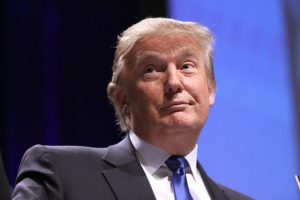 Disruptive. That’s a good word to describe Donald Trump’s presidential candidacy, and to describe the sometimes-ramshackle Republican National Convention his campaign more or less superintended in Cleveland this past week.
Disruptive. That’s a good word to describe Donald Trump’s presidential candidacy, and to describe the sometimes-ramshackle Republican National Convention his campaign more or less superintended in Cleveland this past week.
Apple disrupted the music industry; Uber disrupted the taxi cartels; Amazon disrupted the mega-bookstores. Global competition has been disrupting American manufacturing for decades. The inundation of low-skill immigrants unintentionally produced by the 1965 immigration act has disrupted many communities and big metro areas.
Over history, America has mostly been built by disruption. Certainly the Loyalists in the American Revolution thought so. So did the farmers who cheered for William Jennings Bryan’s free silver as industrialization was disrupting the farm economy.
The New Deal was disruptive. So was World War II. As Yuval Levin points out in his book “The Fractured Republic,” both the political left and political right see the two post-WW2 decades as normal, with high family formation, low crime, strong faith in institutions and relatively smooth economic growth.
But that period was there exception, not the rule. Postwar America was massively disrupted by the John F. Kennedy and Martin Luther King Jr. assassinations, high crime, urban riots and antiwar protests.
That’s the point in time when Donald Trump began using his father’s political connections to move his Brooklyn/Queens real estate business to Manhattan and beyond. And to stamp his last name on casinos, hotels and eventually a reality TV show.
When Trump came down the escalator at Trump Tower 13 months ago and announced his candidacy, almost no commentator took his chances seriously — except the Dilbert cartoonist, Scott Adams.
The other 16 Republicans largely represented a party consensus: conservative on cultural issues; pro tax cuts, backing military interventions and free trade. Trump was different: perfunctory on cultural issues; against the Iraq War; corrosively critical of trade agreements and illegal immigration.
Trump’s victory in the Republican race owes much to $2 billion or so of free media coverage and to his 16 rivals’ unwillingness to risk attacks that might recoil against them. His dystopian picture of America and the world spinning out of control gained credibility after terrorist attacks in San Bernardino and Paris, Orlando and Nice, and even more so after recent mass murder of police officers. This was the centerpiece of his acceptance speech in Cleveland.
Trump didn’t get a majority till he got home to New York April 19, but by May 4 all his rivals withdrew.
It’s widely appreciated that Trump appealed especially to non-college-graduates and older voters. There’s also an ethnic angle. Groups with high degrees of social connectedness and respect for order — Mormons, Dutch- and German-Americans — were largely immune from his appeal. People without such ties, whom he called Thursday night “people who work hard but no longer have a voice,” were drawn to him.
Groups that respond positively to raucous disruptive appeals rallied to Trump: Scots-Irish along the Appalachian spine from western Pennsylvania to northern Alabama; and Italian-Americans, half of whom live with 100 miles of New York City. If you draw a map of counties where Trump topped 50 percent by May 4, the great bulk of them are along that diagonal and within that circle.
For 20 years American elections have been battles between two roughly equal-sized armies in a culture war, with results differing little year to year. It’s easy to predict how 40 states will vote, much harder to predict who will win the election.
Donald Trump may well disrupt this pattern, too. Pennsylvania’s 20 electoral votes seem within his range, as well as Ohio’s 16 and Florida’s 29 — which together would have made Mitt Romney president. Trump seems less competitive in states with younger, more educated populations, such as Colorado (9) and Virginia (13). Heavily German-American Wisconsin (10) seems hostile; low-social-connectedness Nevada (6) quite friendly.
It’s not clear that this disruptive convention will help him. Trump’s managers have disrupted the traditions in place for 30 years. These rules had been: only supporters speak, sessions end promptly at 11 p.m., don’t visibly crush dissent, vet speeches carefully. Monday saw a rules rebellion squashed. Tuesday it was controversy over a bit of anodyne plagiarism. Wednesday it was Ted Cruz’s ringing non-endorsement, booed off the stage.
But there’s another way of looking at a campaign that has not gone conventional wisdom’s way. Disorder and disarray work against the party in power. Terrorist attacks and police shootings are not what America thought it’d get in the Obama years.
As tech billionaire Peter Thiel argued Thursday, disruption is a good thing when old ways — and especially government — aren’t working well.
COPYRIGHT 2016 CREATORS.COM
Photo credit: Gage Skidmore (Creative Commons) – Some rights reserved
 Michael Barone, senior political analyst at the Washington Examiner, (www.washingtonexaminer.com), where this article first appeared, is a resident fellow at the American Enterprise Institute, a Fox News Channel contributor and a co-author of “The Almanac of American Politics.”
Michael Barone, senior political analyst at the Washington Examiner, (www.washingtonexaminer.com), where this article first appeared, is a resident fellow at the American Enterprise Institute, a Fox News Channel contributor and a co-author of “The Almanac of American Politics.”
The views expressed in opinion articles are solely those of the author and are not necessarily either shared or endorsed by Black Community News.
 CURE News and Clergy Blog News and Commentary for Christians
CURE News and Clergy Blog News and Commentary for Christians




Trump is just what this country needed. He gave A LOT of people a wake-up call.
Leave it alone and go back to writing fluff pieces.
We had better have someone who is disruptive. Right now the country is being run by Wall Street and special interest groups. Hillary Clinton is owned by these people and she will do their bidding. What is needed is for Trump to be elected and for him to begin a massive purge of the criminals in Washington.
i took to Trump from the start because i know the conversation, heard it quite a few times in my working career. i put up the super structures of high rises. besides being extremely dangerous it is also demanding in execution. the motto is if i don’t make the man money we lose work. i know him because we lived to come in on time and under budget and when that happens they never fail in generous bonuses, they are not stingy with the profits because it means loyalty. i have stood next to the thousand dollar suits while covered with rust and well remember how they listened to any problem because time means expensive equipment idle and men who want to be busy. they execute the needed adjustments no matter whose toes they have to step on, believe me you do not want to be a supplier who is not on the ball. they for the most part pay over scale and when that last piece of iron goes up, they usually have reserved an entire bar for you and catered T-bones or NY cuts….but most of all they are men of their word.